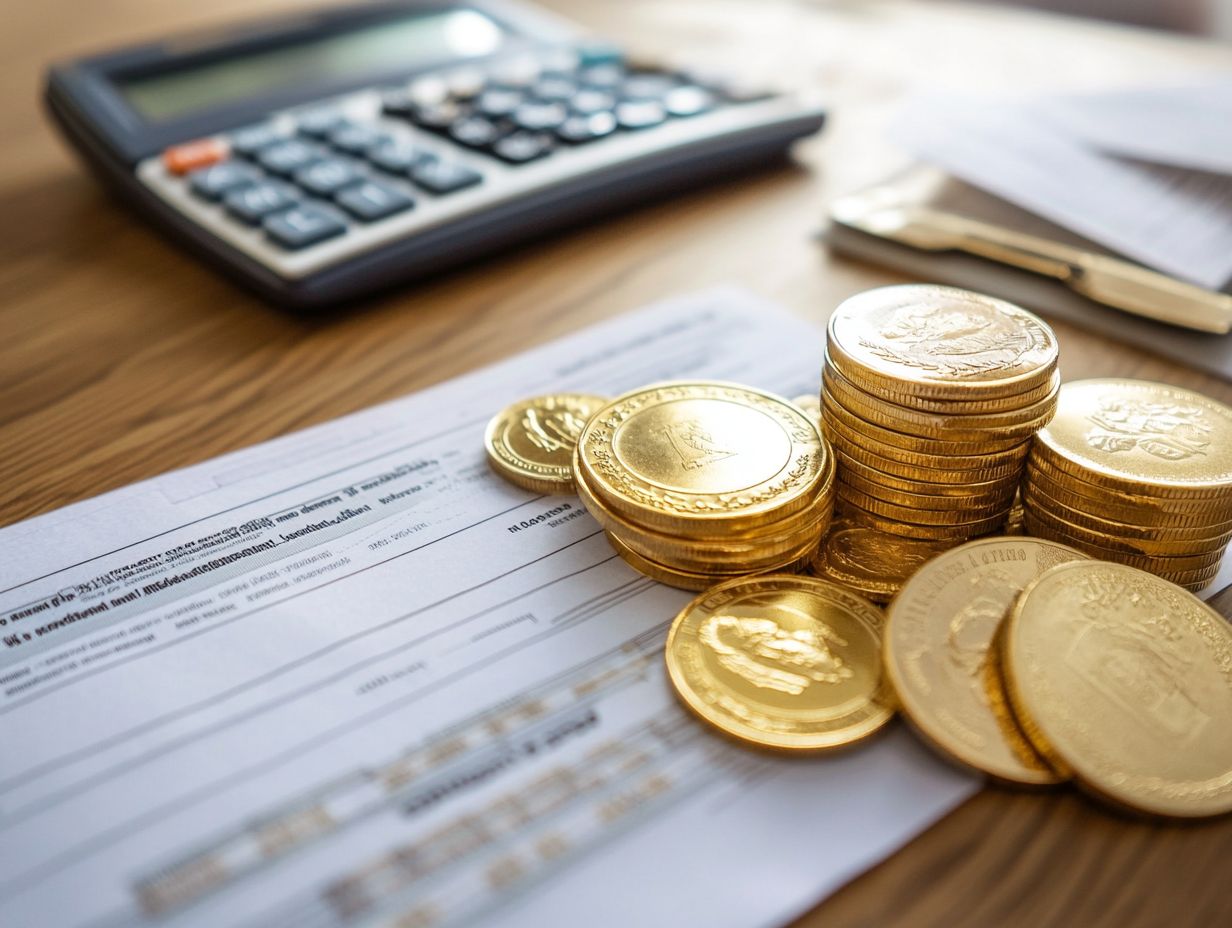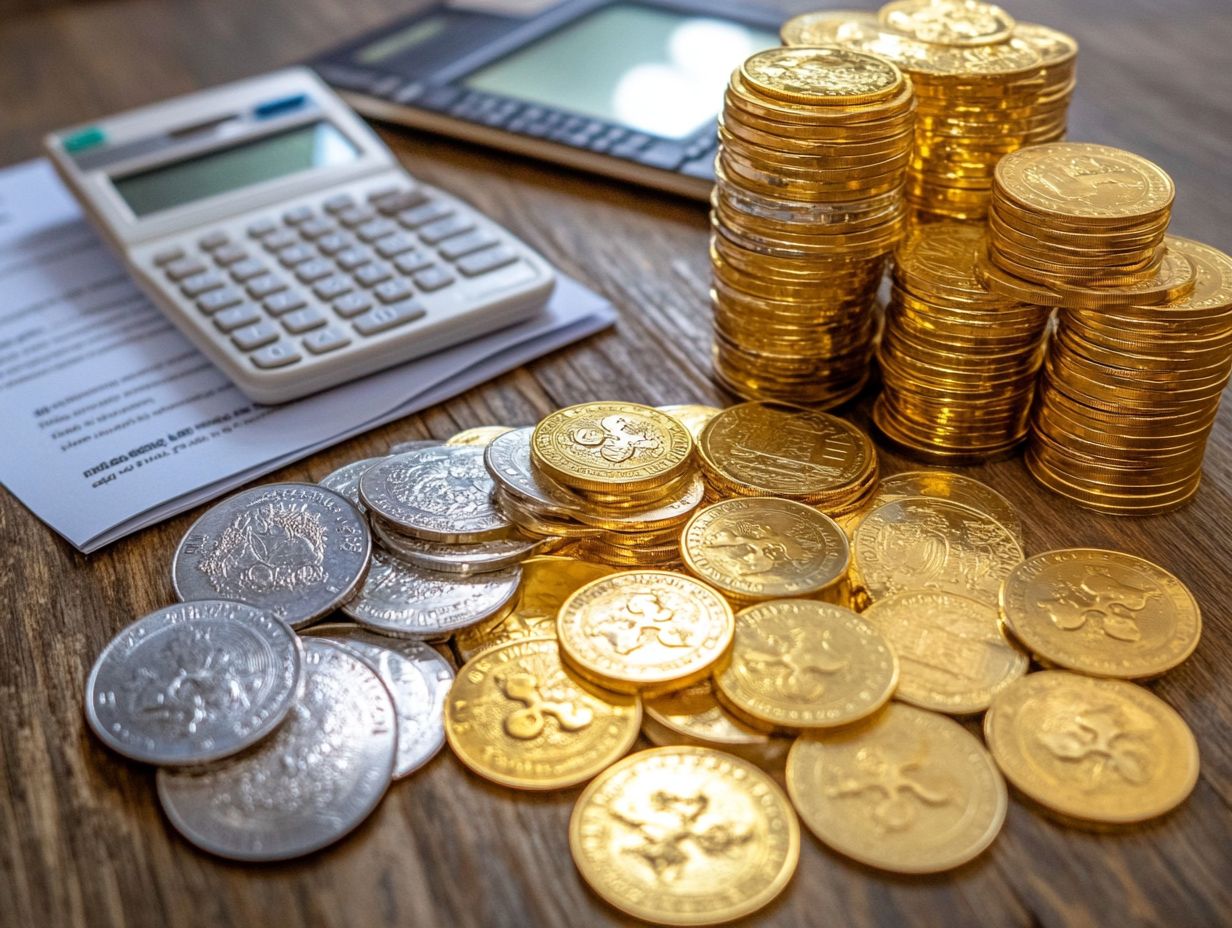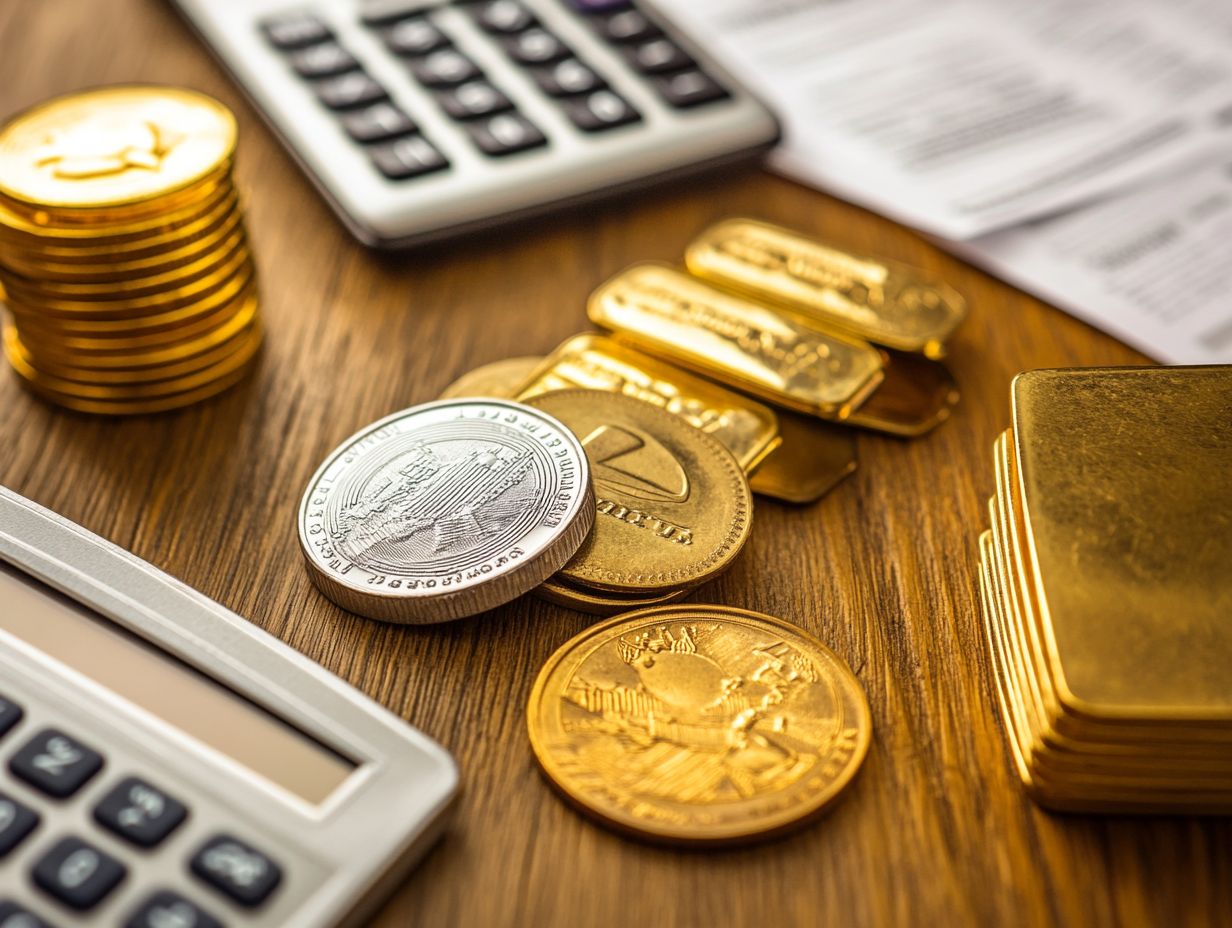Tax Consequences of Precious Metals Inheritance
Inheriting precious metals can be a substantial financial advantage, but it also brings along its own complexities, especially when it comes to taxes.
Grasping the implications of inheriting gold, silver, or other valuable metals is vital for anyone aiming to traverse this intricate landscape. This guide covers key points you need to know, addressing everything from income and inheritance taxes to strategies for reducing your tax burden.
Whether you re an heir or in the process of planning your estate, being well-informed can truly make a significant difference.
Contents
- Key Takeaways:
- Precious Metals as Inheritance
- Tax Implications of Inheriting Precious Metals
- Ways to Minimize Tax Consequences
- Reporting Inherited Precious Metals on Tax Returns
- Legal Considerations for Inherited Precious Metals
- Frequently Asked Questions
- What are the tax consequences of inheriting precious metals?
- Do I have to pay taxes on inherited precious metals?
- Is there a difference in tax consequences for inheriting physical vs. paper precious metals?
- Are there any tax deductions or exemptions for inherited precious metals?
- What happens to the tax consequences if I inherit precious metals from a trust?
- Can I transfer my inherited precious metals to an Individual Retirement Account (IRA) without tax consequences?
Key Takeaways:

- Inheriting precious metals may have tax implications such as income tax and inheritance tax.
- Strategic planning can help minimize tax consequences of inherited precious metals.
- Proper documentation and reporting on tax returns are necessary for inherited precious metals to avoid any legal implications.
Precious Metals as Inheritance
Inheriting precious metals like gold and silver coins can profoundly influence your financial landscape. This is particularly true when you factor in their market value.
Understanding the details of getting these metals appraised is essential. These metals are not just collectibles; they hold intrinsic value and can serve as significant assets within your investment portfolio.
It’s important to understand the IRS rules surrounding inheritance, as they dictate how you should report and manage these metals. Understanding your responsibilities is crucial; don’t wait until tax season to get informed! The potential benefits of inheriting such assets can maximize their value, especially when considering the role of precious metals in tax-advantaged accounts, and ensure a smooth transition into your financial strategy.
Understanding Inheritance of Precious Metals
Inheritance of precious metals, such as gold and silver, involves complex emotional and financial factors. This complexity arises while navigating the ever-changing landscape of market fluctuations and IRS regulations that dictate the legal treatment of these assets.
For you, these inherited treasures often hold sentimental value, stirring memories of loved ones and familial legacies. However, the financial implications can be just as significant. Understanding the tax consequences of donating precious metals can greatly affect your potential tax liabilities when it comes time to part with them.
Market fluctuations influence the immediate value of your holdings. Understanding what qualifies as a collectible is also important in the inheritance process. Balancing the emotional weight of these assets with the need for strategic decision-making is essential for harmonizing sentimental significance with financial wisdom.
Tax Implications of Inheriting Precious Metals
Inheriting precious metals presents a complex tapestry of tax implications that you must carefully consider. You’ll need to navigate aspects such as capital gains (the profit you make when selling an asset) and ordinary income, as well as estate taxes that may emerge from the transfer of these valuable assets.
Understanding the relevant tax rates and the corresponding IRS reporting requirements is crucial for you to effectively manage your financial responsibilities and sidestep any potential legal complications.
Income Tax on Inherited Precious Metals

Income tax implications on inherited precious metals can vary significantly depending on factors like the asset’s appraised value and the applicable tax rate at the time of inheritance. This makes it essential for you to have a solid understanding of IRS regulations.
When you inherit precious metals, the fair market value at the moment of inheritance sets the stage for any potential capital gains tax if you decide to sell them later. The IRS typically allows you to base this valuation on appraisals or sales, which can fluctuate considerably. While these assets may not incur income tax upon inheritance, any future sale could lead to tax liabilities based on the difference between the sale price and the appraised value. For more information, check out our guide on understanding tax brackets for precious metals investors.
To navigate this landscape smoothly, it’s crucial for you to maintain meticulous records of both the appraisal and the sale. This diligence will help ensure compliance with reporting requirements and spare you from any unwelcome surprises when it comes to tax liabilities.
Inheritance Tax on Precious Metals
Understanding the inheritance tax on precious metals is essential for you as a beneficiary. It can significantly impact the net value of your inherited assets and is governed by specific IRS regulations regarding estate taxes.
When you inherit valuable items like gold, silver, or platinum, understanding the tax code for precious metals investments is crucial. The IRS views these assets not only as financial wealth but also as part of an estate that may attract taxation. The appraised value of precious metals at the time of inheritance will determine the estate’s total worth, potentially pushing you into higher tax brackets.
Being aware of the difference between estate taxes and potential inheritance taxes enables you to strategize effectively, ensuring proper planning and foresight that ultimately preserves your inherited wealth, especially when considering the tax implications of precious metals trading.
Ways to Minimize Tax Consequences
Minimizing the tax consequences of inheriting precious metals demands a carefully crafted investment strategy. This strategy should consider both capital gains and potential capital losses, all while following IRS regulations.
By adopting a smart financial planning approach, you safeguard the value of your inherited assets while ensuring compliance with relevant tax implications.
Strategies for Reducing Tax Liability
To reduce your tax liability related to precious metals, you need a keen understanding of capital gains implications and alignment with IRS guidelines for reporting and compliance.
This knowledge is essential for navigating the intricate landscape of tax regulations and maximizing the financial benefits from your investments. For example, holding inherited precious metals for a year or longer could lessen your capital gains tax burden. Additionally, understanding the tax implications of storing precious metals offshore can further optimize your investment strategy.
You can also use tax-deferred accounts to store these assets, which can further minimize your immediate tax implications. Staying informed about tax implications of precious metals in different states and specific IRS regulations concerning capital gains, as well as maintaining comprehensive records of acquisition dates and values, helps you manage your tax liabilities effectively while securing your wealth in precious metals.
Reporting Inherited Precious Metals on Tax Returns

Accurate reporting of inherited precious metals on tax returns is crucial for compliance with IRS regulations. This process involves specific forms, including Form 1040, and requires adherence to detailed reporting guidelines.
As an inheritor, navigating these requirements meticulously is imperative.
Proper Documentation and Reporting Requirements
Proper documentation and reporting requirements for inherited precious metals are vital to maintain compliance with IRS rules. You will utilize forms like Form 1099-B and Schedule D to accurately represent these assets.
These guidelines shield you from potential legal complications and ensure the seamless transfer of wealth. Keeping meticulous records of provenance, valuation, and any transactions involving these metals is crucial for determining their fair market value at the time of inheritance. Understanding the financial impact of precious metals taxation is vital; without this information, your reporting can become convoluted, leading to discrepancies that may trigger audits.
Understanding the implications of capital gains tax and adhering to proper reporting practices allows you to manage your newfound wealth responsibly while ensuring compliance with all necessary IRS mandates.
Legal Considerations for Inherited Precious Metals
Navigating the legal considerations surrounding inherited precious metals requires a careful approach to estate planning and strict adherence to IRS regulations. These complexities can significantly influence how these cherished assets are managed and reported.
Heirs must stay informed and take proactive steps to ensure compliance and protect their interests.
Call to Action: For the best outcomes, consider seeking professional advice tailored to your specific situation regarding inherited precious metals!
Estate Planning and Legal Implications
Estate planning shapes the future of inherited assets, especially precious metals. It requires strategic insight to avoid IRS complications and promote financial growth.
For anyone overseeing an estate with valuable items like gold coins or silver bullion, keeping careful records is very important. A clear plan clarifies the rights and responsibilities of heirs and simplifies navigating intricate tax regulations for precious metals in retirement accounts imposed by the IRS.
Ignoring these considerations can lead to costly penalties or unforeseen taxes. This will ultimately erode the legacy you intend to leave behind. Therefore, strategic planning is essential for preserving your wealth, especially regarding the tax implications of importing and exporting precious metals!
Frequently Asked Questions

What are the tax consequences of inheriting precious metals?
The tax consequences depend on the type of precious metal, the value at the time of inheritance, and your local tax laws. Generally, receiving precious metals as inheritance may trigger capital gains tax if you decide to sell them in the future.
Do I have to pay taxes on inherited precious metals?
In most cases, you will not have to pay taxes unless you sell them or receive income from them. However, it s best to consult with a tax professional to determine your specific obligations.
Is there a difference in tax consequences for inheriting physical vs. paper precious metals?
Yes, inheriting physical precious metals like gold or silver coins is treated differently than paper precious metals like stocks or ETFs. Physical metals are subject to capital gains tax, while paper metals are taxed as regular income.
Are there any tax deductions or exemptions for inherited precious metals?
Unfortunately, there are no specific tax deductions or exemptions for inherited precious metals. However, if you donate them to a qualified charity, you may claim a charitable deduction on your taxes.
What happens to the tax consequences if I inherit precious metals from a trust?
If you inherit precious metals from a trust, the tax consequences depend on the type of trust and its distribution rules. It s best to consult with a tax professional or the trust s administrator for guidance.
Can I transfer my inherited precious metals to an Individual Retirement Account (IRA) without tax consequences?
Yes, you can transfer inherited precious metals to an IRA without incurring tax consequences. However, the transfer must be completed within a specified time frame to avoid potential penalties. It s advisable to consult with a tax professional or IRA custodian for assistance.
It s crucial to consult a financial expert to ensure you re making informed decisions!














